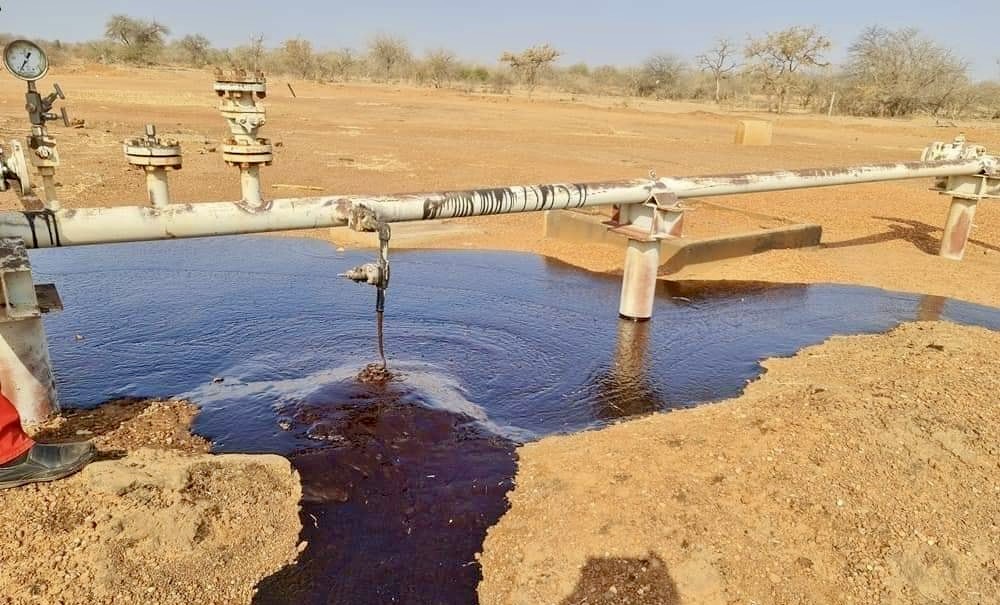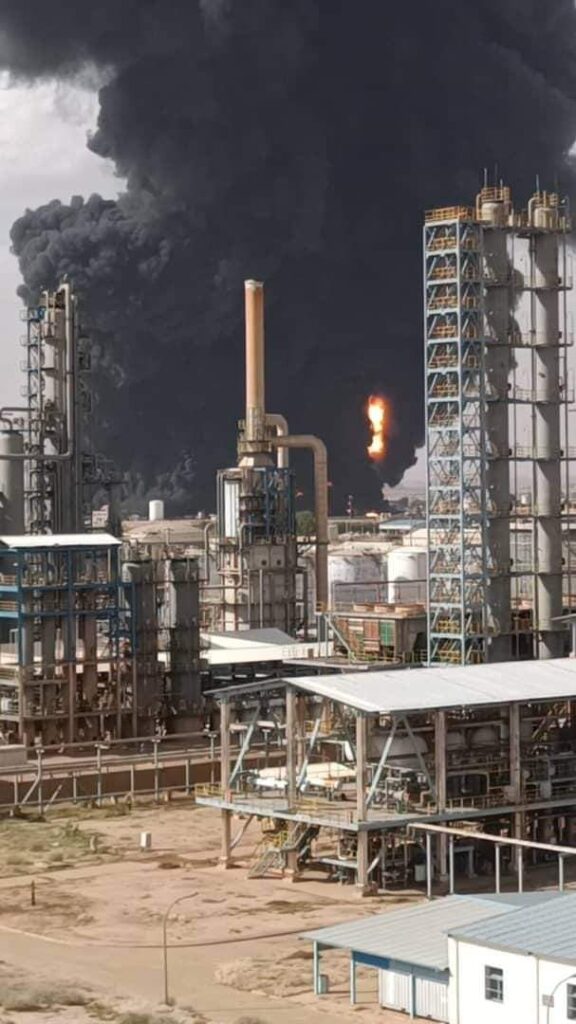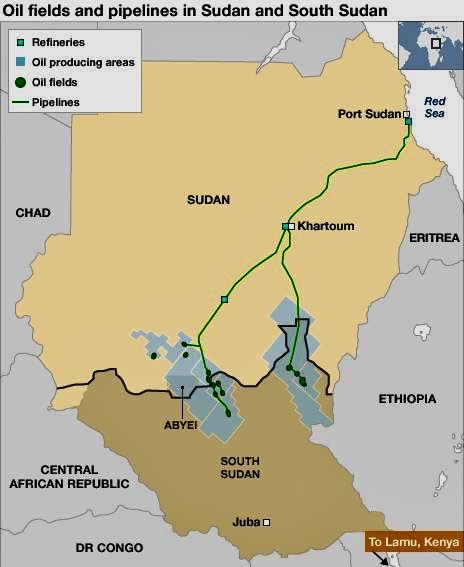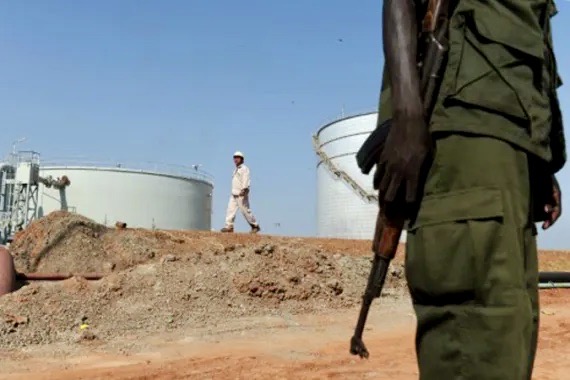Escalating conflict threatens Sudan’s oil
20 November 2023
In a series of escalating attacks, the Rapid Support Forces (RSF) targeted oilfields in East Darfur and West Kordofan, further extending their presence in Sudan’s western region and potentially jeopardising the country’s oil reserves. As Sudan enters its seventh month of conflict between the army and the RSF, the fate of its oil fields and infrastructure hangs in the balance, posing another threat to the nation’s economic stability and regional partnerships.
This morning, violent confrontations between the army and RSF took place around an oil field, sparking fires in the Abu Karinka region of East Darfur State, according to an Ayin correspondent. An RSF attack on an army position caused fires in an oil well complex in the Shaq Omar area in Gad al-Sayid, east of Abu Karinka. This follows an RSF attack earlier this month on the Shag Omar oilfields in the same area.
On 30 October, the RSF captured the Baleela oil fields in West Kordofan State, occupying the army’s 91st Brigade Headquarters. These attacks were preceded by the RSF seizure of a major pumping station in the Al-Ailafon area, northeast Khartoum, in early October.
The Baleela oil fields are directly linked to the Al-Jaili refinery, north of Sudan’s capital, and significantly contribute to oil derivatives used in Sudan, including gasoline and cooking gas, Mohamed Adam* from an oil company working in these fields told Ayin. “Constructing a pipeline from the oil fields in the west of the country to the refinery in the Sudanese capital costs hundreds of millions of dollars,” Adam added. He pointed out that the oil logistical facilities and sites in the country were not treated with “full responsibility” by the two warring parties, especially the Rapid Support Forces, which control more than three sites in Sudan.

Sudan produces less than 40,000 barrels of oil per day, a large portion of which is allocated for local consumption by refining the oil at the Al-Jaili refinery. Sudan has an agreement with South Sudan to pass crude oil to Bashaer Port in Port Sudan for the purpose of export, and it charges annual fees that reach roughly US $150 million.
In a statement released on 7 November, the Sudan Armed Forces spokesperson acknowledged the RSF occupation of the Baleela oil field. He cautioned that the RSF’s alleged “irresponsible and destructive approach to the country’s oil facilities” could result in damage to the infrastructure in the area.
According to Muhammad Judeh, an engineer in the Baleela oil field, the military battles over the oil fields expose them to the risk of permanent loss and freezing of the crude inside the pipes due to the cessation of production from the fields that are under the control of the Rapid Support Forces. “When social unrest occurred in the production areas at the behest of internal parties during the period of Hamdok’s government, the oil installations almost stopped forever,” Judeh told Ayin. “This time the crisis is repeated more frequently, and Sudan is threatened with losing the oil facilities permanently.”
A former official within the oil ministry confirmed to Ayin that oil production in Baleela is at a “complete standstill” while the Al-Jaili oil refinery has stopped functioning except for the power generation unit.

On 7 November a significant fire erupted near the Al-Jaili Oil Refinery, situated 70 kilometres north of the capital. Both warring parties traded accusations over sparking the fire, destroying a critical refinery for the nation’s fuel and gas supply.
The refinery has been under RSF control since the beginning of the war, forcing the army to move the battles to the outskirts of the refinery to avoid any damage, according to a refinery employee who spoke to Ayin. The refinery, a joint venture between Sudan and China, is linked to the extensive pipeline that runs to the Bashayer Port, Red Sea.
The Rapid Support Forces also control the Garri thermal station, which produces electricity. It is located north of the Sudanese capital, adjacent to the Khartoum refinery, and has been out of service for five months.
“What is happening is a real disaster,” says Sharaf El-Deen, an oil sector employee in Khartoum. “The Rapid Support Forces do not know the extent of the impact of their seizure of these oil facilities –their forces lack the sensitivity in dealing with these strategic sites, and it is not possible to enter these sites by carrying out military attacks since this exposes the sites to destruction.”
El-Deen says there is an immediate need to restart communications with local communities and the warring parties to ensure the flow of crude from South Sudan continues to pump through the country.

With 98% of neighbouring South Sudan’s government operating budget relying on oil, the oil ministry’s undersecretary, Mayen Wol Jong, is naturally concerned Sudan’s conflict may curtail production. “South Sudan and its leadership are always dedicated to finding solutions and promoting peace in Sudan and for this reason, it is wise for the parties to the conflict to preserve and protect oil infrastructure,” the undersecretary said in an interview with Sudan Tribune.
According to Augustino Ting Mayai, Head of Research at the Juba-based think-tank Sudd Institute, South Sudan currently has no alternative avenue to refine its oil and will remain neutral to ensure the oil will continue pumping. A complete blockade would be problematic, Mayai told Ayin. “We would likely see a repeat of 2012 when South Sudan shut its oil production leading to an overall non-salary spending cut of approximately 50%, an increase in the collection of non-oil revenue through taxation, food insecurity, and a lack of available hard currency that led to the freeze of most government projects”, he said. Given this foreboding scenario, Mayai adds, South Sudan is determined to stay clear of the conflict and ensure the oil continues to be refined and sold.
Sudan and South Sudan’s crude oil is reaching Port Sudan, the former ministry official told Ayin, but the lack of refined oil has led to a severe scarcity of oil derivatives, such as petrol, diesel, and kerosene. The government is now importing oil derivatives which has affected the foreign exchange reserves in the state treasury, the official added, increasing inflation whereby a US dollar is equal to 1,050 Sudanese Pounds in the parallel markets.
Sudan’s Acting Minister of Energy and Oil, Mohamed Abdullah Mahmoud, confirmed in a press statement on 1 November that there are ongoing efforts to restart the “Diffra”, “Neem” and “Knar” fields located in the Balila area. He pointed out that efforts are continuing with the civil administrations and operating companies to restart the oil fields so that they are not harmed by the stoppage, because “these facilities belong to the Sudanese people, not one party alone.”
* The name has been changed to protect the source for security purposes


